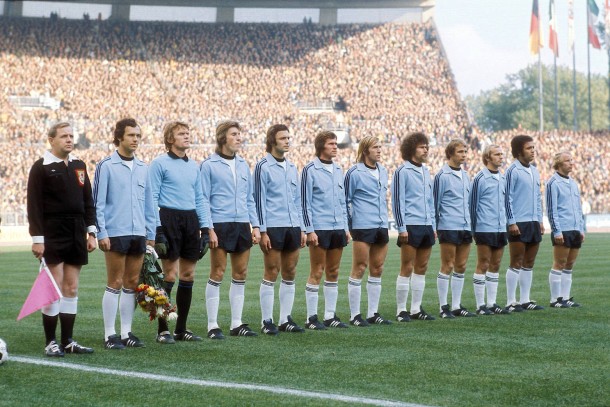Last Friday the German Department hosted a free curated screening of the 2021 independent documentary film “Schwarze Adler” (translated from German: “Black Eagles”). The space they held it in at North Quad was great – it was huge, with floor-to-ceiling windows spanning the length of one wall, whiteboards and cushy chairs spanning the other, and a big blank wall up front to project the film onto. The physically-distanced chairs they’d set up in the room were fairly packed with people coming for the event.
Watching this documentary was a pretty emotional experience for me (which is why it took me so long to write this review!).

Seeing footage in 2021 of fans at a soccer game doing the Hitler salute will do something to your psyche. I’m privileged — some people don’t have the choice of whether to turn away from the screen, because they live through this every day. Imagine being a player on a professional sports team where the only difference between you and your teammates is that your skin is a shade darker. You’re trying to focus on the game you’ve trained for for most of your life when you suddenly hear 1000s of fans in the stands surrounding you, most of which are from your own country where you were born and raised, yelling at you to go back where you came from. That’s an experience that was recounted by every single German soccer player interviewed in this documentary.
The way fans treat athletes is something worth having a whole discussion on. Cheering for your favorite players and booing when the other team scores is all good fun. But when that morphs into jeering, chanting hateful racial slurs, and hurling insults at players, that’s when it becomes absolutely cruel. Michigan football games are not immune to this behavior. We put athletes on pedestals, but they are not made of titanium, they’re made of flesh and blood! They’re humans just like us and when fans dehumanize them, they deprive them of so much: joy from being on the field, joy from being with their teammates, and the focus they need to stay in the game.

Many of the players in the documentary talked about how hearing those shouts of “go back to your country” and “kick out the negro” would affect their playing, and they thought about it for the whole rest of the game. At one point one of the players, Gerald Asamoah said he had “never seen such hate anywhere else before.” One of his fellow teammates of color left Germany to play for Ghana because of the experience. Another player, after being subjected to it for half a game, picked up a small red crate on the sidelines and threw it down in a fit of anger. His teammates said nothing to him — the referee just handed him a yellow card. Another recounted how sad it made him when he saw that not only were the parents chanting slurs, but their small children were too.
Almost all of the players also made connections between the way they were treated to Germany’s dark history. “How can you show this behavior when we have seen exactly where it leads?” I think the same could be said of racism in our country. The U.S. has an equally dark history, it’s just that it’s usually glossed over in our history textbooks.
When the credits began to roll, I was feeling kind of hopeless and defeated. I know that’s not the right response to world issues, but I couldn’t help it. But then one of the professors from the German department got up to say a few words.
Here’s what she said, paraphrased:
“Don’t be disheartened. These thoughts of racism have accrued over centuries and it will take time to undo them. Martin Luther King Jr. was only assassinated 52 years ago so really we’re just at the beginning of the work to undo it. And don’t feel bad if you are not the one who goes out and marches and shows up in a big way. The small acts matter to. Every act of kindness, and every act that does something to acknowledge the humanity in others matters.”
So go out and show up in a small or in a big way this week, and know that we have a long way to go but every act matters.


